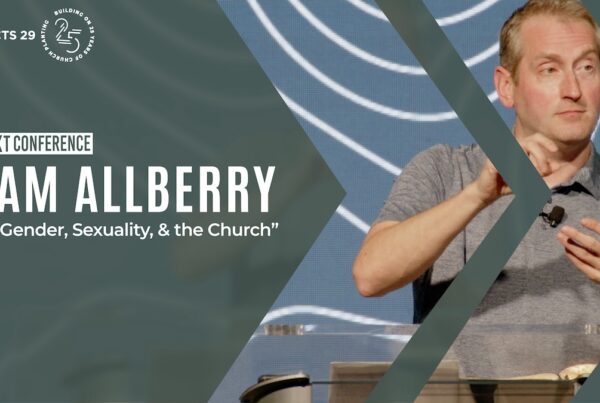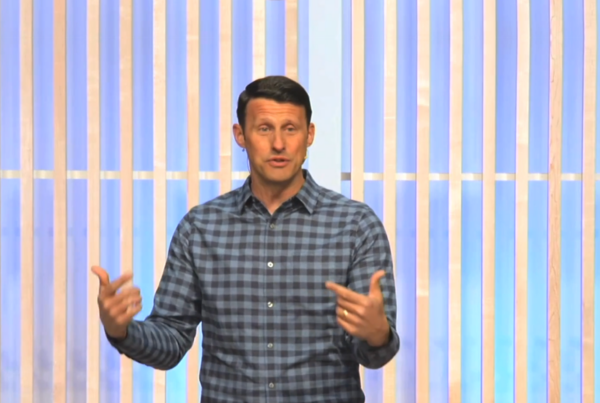“The more selfish I am, the more I will compare. The more selfless I am, the less I will care.”
The age of the internet has brought about many blessings. Access to endless information provides ease in educational growth that the world has never known. Sharing various forms of media has never been more simple and affordable. Worldwide communication has opened endless possibilities for missions, especially engaging the unengaged people groups of the world.
But with the many blessings of the internet comes an abundance of curses as well. One of the main downsides of the internet is that it can quickly draw our hearts to comparison that leads to jealousy and envy. We have easy and instant access to what everyone around us is doing and thinking.
“Look at that vacation they had!”
“Look at how cute their kids are!”
“Look at how amazing their new home is!”
This digital exposure to everyone, everywhere can challenge church planters as well.
“We saw 15 people baptized last Sunday!”
“Our new building program is moving along quite nicely!”
“I was asked to speak at the …(famous, big, and slick)… conference. Hope to see you there!”
These types of statements tempt us to frequently wonder if we are truly accomplishing anything. Are we important at all? Have we been left behind? Internet exposure seems to force these questions upon us. But, of course, biblically speaking, these questions arise from sinful hearts so it might be helpful to ask why we are so prone to comparison?
My conviction is threefold:
- We compare because we don’t know who God has made us to be.
- We compare because we don’t like who God has made us to be.
- We compare because we pursue the wrong glory.
I Don’t Know Who I Am But I Know Who I Want To Be
When we are younger, say, in our twenties and early thirties, we don’t always have a settled confidence in who God has made us to be. We are not quite sure where we are gifted and where we are weak. It takes trial and error, consistent feedback, and much self-examination to grow content in who we are and who we are not.
When I was younger I often felt insecure because I didn’t know who I was. From this sense of insecurity came the feeling that I needed to hurry up and figure out who I was; I was in a rush to validate myself.
When this is the case, we often find someone we truly appreciate and seek to emulate them. That person is the standard by which we judge who we want to be, the standard for faithfulness. He or she exhibits the gifting that we are pursuing. We don’t know who we are but we know who we want to be. If I could just be like him/her, then I’d be happy.
And this is often where the comparison sets in. How well do I measure up to so and so? But here is where it becomes really tricky. We may ask ourselves, “Who in my circle of relationships exhibits similar gifts to a person that I want to emulate, and are they more like that person than I am?”
Make no mistake, the sin of comparison wants to be your master, and we are often willing slaves.
For example, if you want to be a gifted preacher, you could constantly compare yourself to Mr. Big Time Preacher. But even more so, you may be in subtle (or not so subtle) comparison/competition mode with those around you who have similar gifts as Mr. Big Time Preacher. They might pose a threat to the gifts that you want. You might be tempted to think, “If he excels in his gifting and his gifting is more pronounced than mine, no one will notice mine!” Make no mistake, the sin of comparison wants to be your master, and we are often willing slaves.
When you don’t know who you are, it’s easy to simply compare yourself to others rather than doing the hard, patient work of trial and error, consistent, honest feedback, and self-examination. In order to sever the vein of comparison, we have to know who God has made us to be.
How do we go about this?
I would suggest a simple, yet challenging, battle plan:
- Identify your internal sense of call. When do you feel most alive? Craft your ideal job description. What do you find there? What would you do for free if money was not an issue?
- Identify your external sense of call. Find a few people who love God, love you, love the Bible, are willing to be painfully honest with you, and who you would label as “wise.” Ask them if they affirm these feelings of #1.
After going through this simple, two-step process you are probably 85% close to who God has made you to be. These feelings of “who I am” or “calling” can change over time (and often do). If this is the case, simply go back and walk through these new feelings with the two steps above.
However, this can easily lead to another problem that directs us toward sinful comparison.
I Know Who I Am But I Don’t Like It
As a parent, it grieves my heart greatly when I joyously shower my children with gifts on Christmas morning, but in response they look to the gifts of their siblings and throw a tantrum because someone else has something “better” in their view. “I don’t like this gift! I want their gift!”
You can wish that you were someone else, but that is simply a slap in the face to your Creator. You’d never slap the President of the United States in the face. How much more should we tremble at the prospect of slapping the President of the Universe in the face? Why would we dare to constantly compare ourselves with the gifting of others? This grieves the heart of our heavenly Father and harms us in the long run.
For me, I have oftentimes found that the issue of comparison boils down to impatience. The gifts that I have don’t “work” fast enough, and I want to feel that sense of validation from “results.” We hate having to wait to see if our personal gifts will produce anything of lasting value. We look around us and discover that we would rather have someone else’s gifts that seemingly yield more immediate bang for the immediate buck.
This comparing heart lacks the right perspective. In this view, I am thinking with the lens of the temporary and fail to see with the eyes of eternity. Strangely, our own speed often outpaces the speed of the Lord. We are harassed by the demands of our tireless, selfish ambition that craves the immediate rush of instant results. But what happens in one moment of time is rarely the gauge that the Lord uses to measure success over the long haul.
Consider this: some of the most important people in the Bible had one small role to play that led to the bearing of massive kingdom fruit. But in the short term they couldn’t see what they were accomplishing. They had to taste eternity to see the fruit of their obedience (see all of Hebrews 11). This required patience. So wait, and be careful to whom or what you are comparing yourself. Whatever is big, flashy, and talked about right now may not be that way tomorrow. Be patient. That pastor you are comparing yourself to might be having an affair right now. It’s just a matter of time for him to be found out. Again, be patient. That pastor you are subtly competing with in your heart might be doing the work of ministry in the flesh and not the Spirit. Be patient. That pastor whose ministry you envy might be on the edge of implosion due to the high-stress demands of his huge, famous, and much-discussed ministry. You’ll know in time. Be patient.
A temporal assessment of “where you are” compared to “where they are” may nag at you at times. But “where you are” often fails to remember that your assessment is only that. Yours. Again, God may have plans in mind for you that you simply can’t see right now.
Comparison will crush you. Faith-fueled patience helps us crucify comparison.
Remember, true pastoral significance can’t be effectively measured in a moment, a month, or even a year. A decade? A lifetime? Who knows for sure? Our self-assessment is painfully lacking in perspective. When you are lying on your deathbed your assessment might have more weight, but even then there will be mysteries that only eternity can solve. True clarity in these matters is only for the omniscient. They are not meant for you. Press on, brother. Significance and legacy will come in time, but the legacy is Christ’s work. Lusting after gifts you would rather have will never lead to good fruit. Waiting for the Lord to work through you in his own way and in his own time is all that we can do. Comparison will crush you. Faith-fueled patience helps us crucify comparison.
Finally, let’s consider one more facet of our constant comparison.
Glory Hogs
Constant comparison is toxic to our spiritual health because it is fueled by one thing: pride. Said bluntly: when we constantly compare, our ministry has become about our own glory and not the glory of the one true God. Deep down we just want people to praise us and not God. Maybe our actions and speech don’t appear to be quite so brash, but are more subtle in nature. God can have his glory, but can’t I just have a little too?
1 Peter 4:10-11 helps us go to battle with this mindset.
As each has received a gift, use it to serve one another, as good stewards of God’s varied grace: whoever speaks, as one who speaks oracles of God; whoever serves, as one who serves by the strength that God supplies—in order that in everything God may be glorified through Jesus Christ. To him belong glory and dominion forever and ever. Amen.
When we constantly compare, our ministry has become about our own glory and not the glory of the one true God.
Note a couple facets of this text. First, we all have gifts. Peter’s assumption here is that God is not stingy in his giving of gifts, but showers them on all his Spirit-filled people in the church. Second, what is the purpose of these gifts? To boost our insecure egos? Never. We have been given gifts so that we can serve the beauty of the church. We are called to use these giftings and unique wirings so that the church can flourish and so God can get the glory, not us. “That in everything God may be glorified…”
At what point did our gifts in ministry become about us? My heart is drawn to comparison because I am addicted to my own glory rather than the Lord’s. Why do we care so much? Is this about the Lord doing what the Lord is going to do, or does he have to use us and our personal gifts?
As we are tempted to compare, it is important to remember that God doesn’t need us.
But he wants us.
He wants a heart that is fully his. He will not share his glory with another. Constant comparison shows that there is much room for repentance in our hearts. There is no true joy in our own glory. It might feel good in the moment, but will leave you like a dog chasing its tail. You never arrive. God created you to arrive when you revel in his glory, not your own. This puts your heart at ease and frees you to love, pursue patience, and rest in who God has made you to be.
So where do you find yourself? Healthy church planting must be done in the freedom of knowing who you are, celebrating however God chooses to use you, and seeking his glory and his alone. Let’s fight for this orientation.











